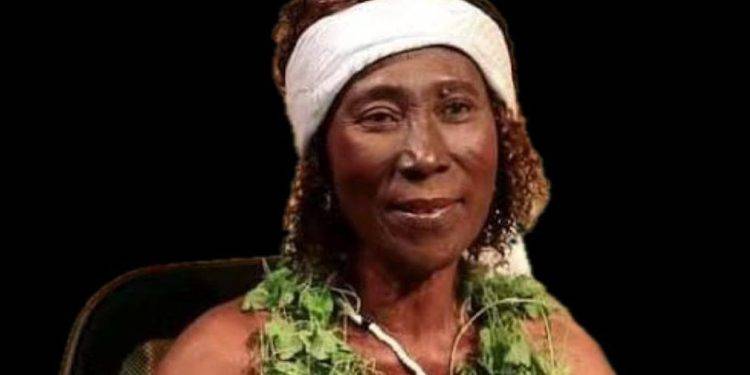The Ghanaian music scene is mourning the loss of one of its iconic figures, Naa Amanua Dodoo, widely known as Naa Amanua. The legendary traditional singer, famed for her association with the Wulomei band, has passed away, leaving behind a legacy that will forever be remembered in the annals of Ghanaian music history.
The news of her untimely demise was confirmed on social media by veteran Highlife musician, Rex Omar. The announcement was brief yet poignant, as he expressed his sorrow: “R.I.P Naa Amanua of Wulomei fame,†shared the Chairman of the Ghana Music Rights Organization (GHAMRO). The passing of Naa Amanua marks the end of an era for traditional Ghanaian music, with her powerful voice and dedication to her craft having inspired generations.
Naa Amanua began her music career in the 1960s, rising to prominence as a member of the Wulomei band, one of the most influential traditional music ensembles in Ghana. The Wulomei band, known for its distinctive blend of highlife and indigenous rhythms, became a platform for Naa Amanua to showcase her incredible vocal abilities and tell the stories of her people through music.
Her songs, rich with cultural significance, often wove traditional tales and explored themes of social justice, unity, and empowerment. Naa Amanua’s music was more than just entertainment; it was a medium for social change. She used her platform to advocate for women’s rights, using her voice to address issues affecting women in Ghana and beyond. Her ability to combine the power of her voice with the depth of her messages made her an influential figure not only in the music industry but also in the broader movement for social justice in the country.
Throughout her career, Naa Amanua released numerous albums that resonated with a wide audience. Her distinctive voice, which had the rare ability to both soothe and stir, made her a favorite among music lovers in Ghana and across the African continent. Her music was a reflection of her deep roots in Ghanaian culture, but it also transcended geographical boundaries, connecting with listeners from various backgrounds and cultures.
Naa Amanua’s passing comes as a deep loss to the Ghanaian music community, as she was one of the last remaining pillars of traditional music in the country. Her contributions to the development and popularization of Ghanaian music cannot be overstated, as she helped lay the foundation for many of today’s traditional and highlife musicians.
Her advocacy for women’s rights, particularly in the context of her music, further solidified her role as a cultural and social trailblazer. Naa Amanua was not just a musician; she was a voice for the voiceless, a champion for the marginalized, and a beacon of hope for many who faced social and economic challenges. Through her songs, she empowered women, encouraging them to rise above societal constraints and pursue their dreams.
In a tribute to her life and legacy, many in the music industry have come forward to express their admiration for Naa Amanua. Rex Omar, who shared the news of her passing, is one of many who have paid their respects, acknowledging the immense impact she had on Ghana’s music scene. Her death has left a void that will be difficult to fill, but her contributions will undoubtedly continue to inspire future generations of musicians.
As tributes pour in from across the country, Naa Amanua’s family, friends, and fans are left to mourn the loss of a beloved figure. Despite her passing, her music will live on, a testament to the indelible mark she left on the music industry and the hearts of those who were touched by her songs.
For those who were fortunate enough to experience her live performances, Naa Amanua’s stage presence was magnetic. She had the rare ability to command attention with every note, her energy and passion infectious. Her ability to connect with her audience made her performances unforgettable, and she was widely regarded as one of Ghana’s finest traditional singers.
As the country mourns her loss, many are reflecting on the profound impact Naa Amanua had on the cultural landscape of Ghana. Her music bridged the gap between the past and the present, preserving the rich traditions of the country while also pushing boundaries and advocating for change. In a world where music often serves as a mirror to society, Naa Amanua’s work will forever be remembered as a reflection of her deep commitment to her craft and her community.
Naa Amanua’s death serves as a stark reminder of the fragility of life, but it also highlights the lasting legacy of those who dedicate their lives to the betterment of others. Her work will continue to resonate for years to come, ensuring that her contributions to Ghanaian music and culture are never forgotten.
As we say goodbye to Naa Amanua, we celebrate her life and the music she gave us. Her songs will remain an enduring part of Ghana’s cultural heritage, and her voice will continue to echo in the hearts of those who loved her. Rest in peace, Naa Amanua—your music lives on.


